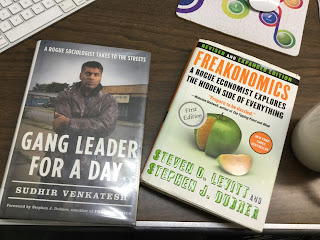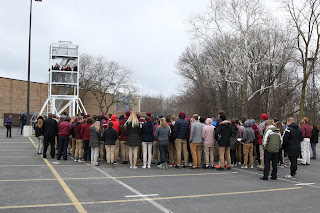Day 14: Budding Sociologists
As I've mentioned before, I am teaching a one-semester sociology class this year - once in the fall and once in the spring. By doing so, I have also joined the social studies department, which demographically is opposite of the English department. Our English department has a male chair and seven female teachers, while the sociology department has a female department head and is entirely staffed by men (and now me). The department meetings therefore have a very different feel (also, rumor has it Soc Studies has donuts. We never have donuts - too health-conscious).
One interesting thing about my course is that sociology is not a core class; it is an elective, for which the students receive no additional credit to supplant another course requirement. As I mentioned in my last post, most of my students I've had before or have currently in AP English. Unlike our psychology elective in the past, Soc is not offered as a dual credit or AP course, so it really is just for fun and exposure. What I'm loving so far is all the cool discussions we have and things we are reading.
Last week they read a chapter from Freakonomics, an excellent text looking at unique problem solving using an economist's toolbox. The chapter in question analyzed 40 years of birth records from the state of California, and looked particularly at ethnic-sounding names (particularly African American) and hypothesized ties to future success by overlapping the data with census records. It tied in with our first conversations about correlation and causation; does giving a child a "black-sounding" name make him or her more likely to be a lower income earner and get fewer job interviews, or are families that are generally low income or low educated to begin with more likely to give their kids black names, thereby making it correlative and not causative? Levitt and Dubner seem not terribly concerned with controversial findings, only with the process - which is exactly what I wanted my students to consider too.
This week they read the first chapter from Gang Leader for a Day: a Rogue Sociologist Takes to the Streets by Sudhir Venkatesh, currently a professor at Columbia. As a graduate student in 1989 at the University of Chicago, Venkatesh finds himself on a project with famed sociologist William Julius Wilson, and what begins with an awkward encounter asking a gang member "How does it feel to be black and poor?" ends with years of his befriending and "hanging out with" members of the Black Kings gang in the notorious Robert Taylor public housing project, getting insider information on how a Chicago crack gang operates.
We read the first chapter as a part of our conversation on participant observation research, and why sometimes it gleans better data than surveys. Then we had a discussion day (in the band room - it was air conditioned) about how this type of research in some ways also poses problems. For example, Venkatesh got very close to his subjects - and often played a significant role in the very society he was trying to study. Participant observation also proposes ethical dilemmas; Venkatesh questions what he is supposed to do when he witnesses someone getting beat up, drug gangs and prostitutes openly flouting the law, or government officials behaving corruptly.
In preparation for our convo they watched a TED Talk by Steven Levitt on his joint research with Venkatesh for a chapter in Freakonomics. Venkatesh got ahold of the gang's financial records, and discovered a few things that shocked by students:
1. The typical low-level drug dealer in the early 90s earned about $3.50 an hour and lived with his mom
2. Growing up a young black man - NOT part of a gang - in the American inner city had approximately twice the chance of dying as a soldier fighting in Iraq
3. Growing up a young black man who DID deal drugs had a 7% chance of dying per year - about 25% chance over four years
As a part of our class discussion, we questioned the differences between crack cocaine and cocaine and the economic ramifications of those differences; motivations for youth to join the drug trade, and possible options policy-makers could consider to counteract that; just why it was safer to be on Death Row than selling drugs in inner-city America; and, somehow, they made the comparison between some of William Julius Wilson's theories on "black flight" after the Fair Housing Act left concentrated poverty in the inner cities to Gotham City's Arkham Asylum concentrating all the super-villains in one location.
Thank you for reading about my sociological highs; I love this class and the discussions and the questions my students are asking even in the first month that suggests they are already changing how they see the world through a new sociological lens. When I suggested they might later write a movie paper where they analyze a sociological concept within one of their favorite movies, their eyes lit up - how often do English teachers get to see eyes light up when we suggest writing a research paper?
[It's a rhetorical question, but my answer is almost never]
One interesting thing about my course is that sociology is not a core class; it is an elective, for which the students receive no additional credit to supplant another course requirement. As I mentioned in my last post, most of my students I've had before or have currently in AP English. Unlike our psychology elective in the past, Soc is not offered as a dual credit or AP course, so it really is just for fun and exposure. What I'm loving so far is all the cool discussions we have and things we are reading.
Last week they read a chapter from Freakonomics, an excellent text looking at unique problem solving using an economist's toolbox. The chapter in question analyzed 40 years of birth records from the state of California, and looked particularly at ethnic-sounding names (particularly African American) and hypothesized ties to future success by overlapping the data with census records. It tied in with our first conversations about correlation and causation; does giving a child a "black-sounding" name make him or her more likely to be a lower income earner and get fewer job interviews, or are families that are generally low income or low educated to begin with more likely to give their kids black names, thereby making it correlative and not causative? Levitt and Dubner seem not terribly concerned with controversial findings, only with the process - which is exactly what I wanted my students to consider too.
This week they read the first chapter from Gang Leader for a Day: a Rogue Sociologist Takes to the Streets by Sudhir Venkatesh, currently a professor at Columbia. As a graduate student in 1989 at the University of Chicago, Venkatesh finds himself on a project with famed sociologist William Julius Wilson, and what begins with an awkward encounter asking a gang member "How does it feel to be black and poor?" ends with years of his befriending and "hanging out with" members of the Black Kings gang in the notorious Robert Taylor public housing project, getting insider information on how a Chicago crack gang operates.
We read the first chapter as a part of our conversation on participant observation research, and why sometimes it gleans better data than surveys. Then we had a discussion day (in the band room - it was air conditioned) about how this type of research in some ways also poses problems. For example, Venkatesh got very close to his subjects - and often played a significant role in the very society he was trying to study. Participant observation also proposes ethical dilemmas; Venkatesh questions what he is supposed to do when he witnesses someone getting beat up, drug gangs and prostitutes openly flouting the law, or government officials behaving corruptly.
In preparation for our convo they watched a TED Talk by Steven Levitt on his joint research with Venkatesh for a chapter in Freakonomics. Venkatesh got ahold of the gang's financial records, and discovered a few things that shocked by students:
1. The typical low-level drug dealer in the early 90s earned about $3.50 an hour and lived with his mom
2. Growing up a young black man - NOT part of a gang - in the American inner city had approximately twice the chance of dying as a soldier fighting in Iraq
3. Growing up a young black man who DID deal drugs had a 7% chance of dying per year - about 25% chance over four years
As a part of our class discussion, we questioned the differences between crack cocaine and cocaine and the economic ramifications of those differences; motivations for youth to join the drug trade, and possible options policy-makers could consider to counteract that; just why it was safer to be on Death Row than selling drugs in inner-city America; and, somehow, they made the comparison between some of William Julius Wilson's theories on "black flight" after the Fair Housing Act left concentrated poverty in the inner cities to Gotham City's Arkham Asylum concentrating all the super-villains in one location.
Thank you for reading about my sociological highs; I love this class and the discussions and the questions my students are asking even in the first month that suggests they are already changing how they see the world through a new sociological lens. When I suggested they might later write a movie paper where they analyze a sociological concept within one of their favorite movies, their eyes lit up - how often do English teachers get to see eyes light up when we suggest writing a research paper?
[It's a rhetorical question, but my answer is almost never]






Comments
Post a Comment